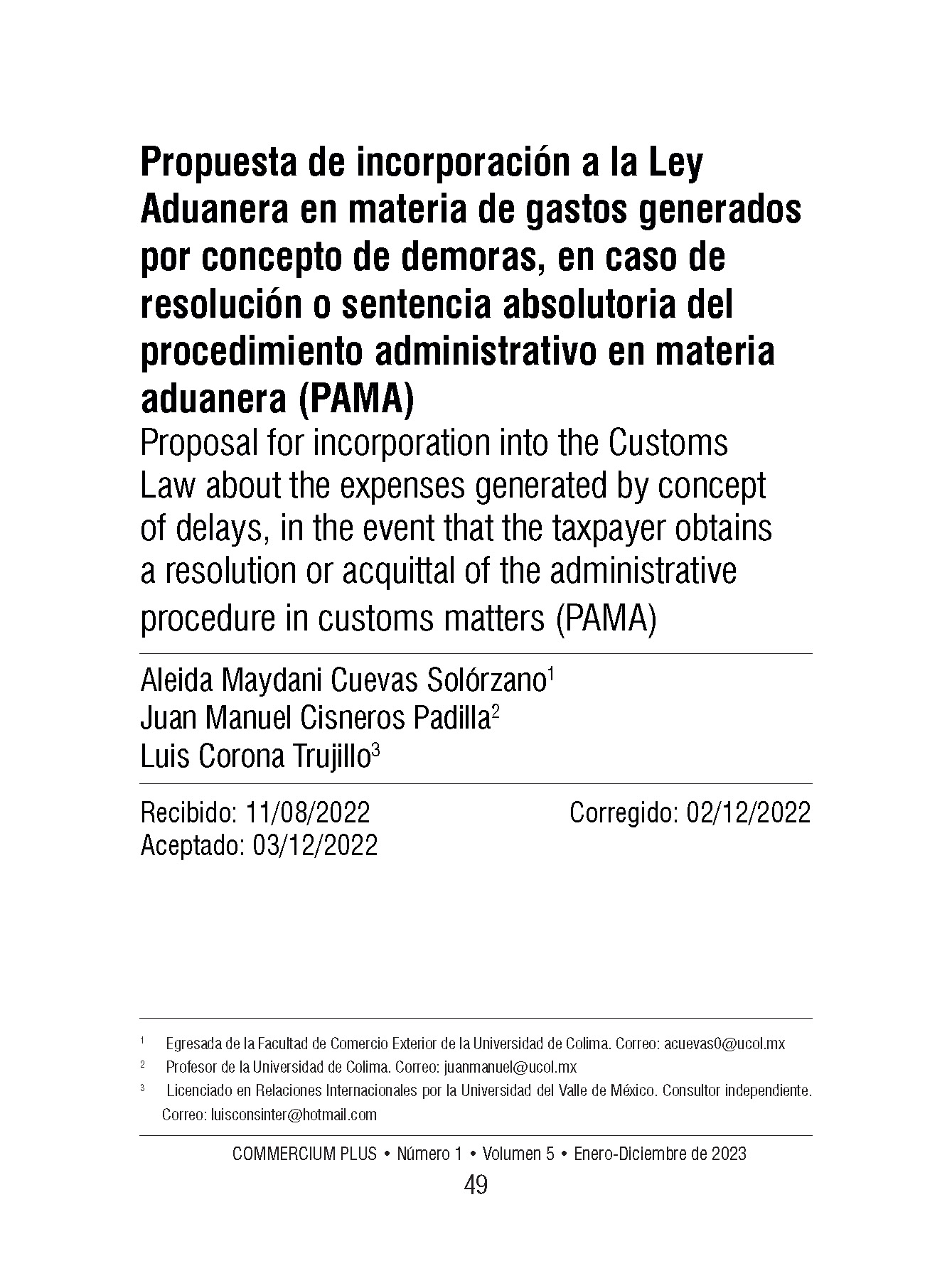Proposal for incorporation into the Customs Law about the expenses generated by concept of delays, in the event that the taxpayer obtains a resolution or acquittal of the administrative procedure in customs matters (PAMA)
DOI:
https://doi.org/10.53897/RevCommerP.2023.05.03Keywords:
addition, modification, favorable sentence, evolutionAbstract
This work presents a proposal of “addition” to the Customs Law so that in customs of maritime traffic in Mexico, the expenses produced by the non-delivery or return of the container in which the foreign trade merchandise was interned for its better transfer to its owner (shipping company) within the time established in the maritime transportation contract, commonly called “delays” in customs jargon, by the importer/exporter taxpayer as a result of the lifting of the act of embargo by the customs authorities, subsequently distorted, are covered by the federal treasury, only in cases where the taxpayer obtains a resolution or acquittal from the administrative procedure in customs matters (PAMA), since to date the expenses of delays that are generated due to the substantiation of the PAMA, which manage to be distorted through the legal means of defense, before administrative authorities or the federal court of administrative justice, are covered by the importer/exporter, despite the fact that there are resolutions or sentences that distort, revoke or annul administrative procedures in customs matters, having been wrongly and illegally substantiated against importers and/or exporters of foreign trade merchandise at maritime customs. Customs matters have undergone different changes in their composition, for a little over two decades now, which has caused a very dynamic evolution in the processes and procedures established by the Customs Law, which has derived on a paradigm shift for understand customs matters.
Downloads
References
Acosta, M. (2003). Compendio de derecho administrativo (4a ed.). Porrúa.
Álvarez, A. (2017). Procedimiento Administrativo en Materia Aduanera (9a ed.) Industrial.
Carvajal, M. (2007). Derecho Aduanero (14a ed.). Porrúa.
Carvajal, M. (2000). Derecho Aduanero (9a ed.). Porrúa.
Hernández, A. (2002). Estudio práctico de las infracciones y sanciones aduaneras, análisis de las infracciones y sanciones aduaneras que imponen las autoridades fiscales conforme a la Ley Aduanera. ISEF.
Hernández, A. (2003). Estudio práctico de los PAMA, cómo evitar caer en un embargo precautorio de mercancías de importación y prevenir las severas consecuencias. ISEF.
Hernández, M. (2005). El embargo precautorio en materia aduanera, estudio práctico de sus con-secuencias jurídicas y los medios de defensa. ISEF.
Rohde, A. (2002). Derecho aduanero mexicano. Regímenes, contribuciones y procedimientos aduaneros (Tomo II). ISEF.

Downloads
Published
How to Cite
Issue
Section
License
Copyright (c) 2023 COMMERCIUM PLUS

This work is licensed under a Creative Commons Attribution-NonCommercial-ShareAlike 4.0 International License.
COMMERCIUM PLUS permite compartir, copiar y redistribuir el material en cualquier medio o formato; adaptar, remezclar, transformar y construir sobre el material, dando crédito a la obra de manera adecuada y proporcionando un enlace a la licencia, indicando si se han realizado cambios.






